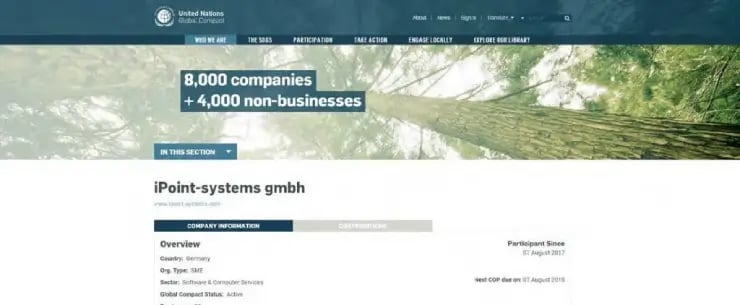On August 7, 2017, iPoint was officially welcomed as a participant of the United Nations Global Compact (UNGC). Launched in 2000, the UNGC has become the world’s largest and most widely embraced voluntary corporate sustainability initiative, with more than 9,000 participating companies from 163 countries, as well as over 4,000 non-business participants.
As a UNCG participant, iPoint has committed to aligning our corporate strategy, day-to-day operations, and organizational culture with ten universally accepted principles in the areas of human rights, labor, environment, and anti-corruption, and to engaging in collaborative projects which advance the broader development goals of the United Nations, particularly the Sustainable Development Goals. A further key requirement for participation in the UN Global Compact is the annual submission of a Communication on Progress (COP) report that describes our efforts to implement the UNGC’s Ten Principles.
Our vision, our long-term strategy, and our current efforts are already very much in line with the principles of the UN Global Compact. Therefore, it was a logical step for iPoint to join this initiative and thus underline our commitment both as a company and a corporate citizen to accelerate the transition towards a sustainable future.
iPoint’s first COP report is due on August 7, 2018, and we’ll keep you posted about our progress and upcoming measures to supporting the implementation of the Ten Principles of the UN Global Compact.
Info Box: The Ten Principles of the UN Global Compact
Human Rights
- Businesses should support and respect the protection of internationally proclaimed human rights; and
- make sure that they are not complicit in human rights abuses.
Labor
- Businesses should uphold the freedom of association and the effective recognition of the right to collective bargaining;
- the elimination of all forms of forced and compulsory labor;
- the effective abolition of child labor; and
- the elimination of discrimination in respect of employment and occupation.
Environment
- Businesses should support a precautionary approach to environmental challenges;
- undertake initiatives to promote greater environmental responsibility; and
- encourage the development and diffusion of environmentally friendly technologies.
Anti-Corruption
- Businesses should work against corruption in all its forms, including extortion and bribery.




.png)

